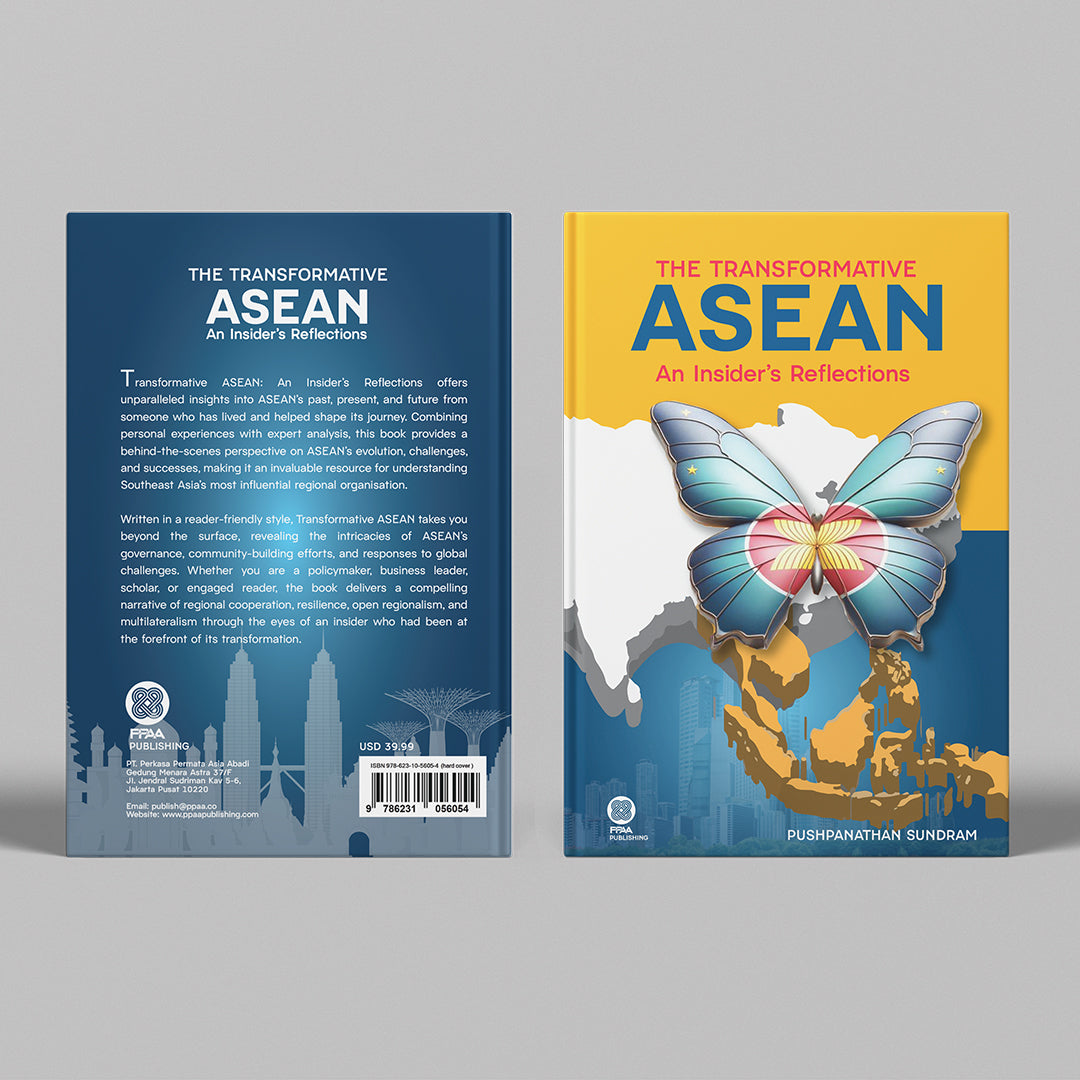PPAA Publishing
The Transformative ASEAN: An Insider's Reflections - Hard Cover
The Transformative ASEAN: An Insider's Reflections - Hard Cover
Couldn't load pickup availability
This book offers an insightful narrative of ASEAN’s extraordinary journey from its inception in 1967 to its current role as a cornerstone of stability, economic growth, and multilateral diplomacy in Southeast Asia. Drawing on his fifteen years at the ASEAN Secretariat, Dr. Pushpanathan Sundram provides an unparalleled insider and institutional perspective on ASEAN’s successes, challenges, and evolution. Through engaging anecdotes and analysis, this book highlights ASEAN’s resilience in navigating geopolitical shifts, fostering regional cooperation, and addressing emerging issues such as climate action, non-traditional security, and economic integration.
Whether you are a student of regional politics, a business leader exploring opportunities in Southeast Asia, or a policymaker seeking to understand ASEAN’s transformative role, this book is your definitive guide. It uncovers the principles, frameworks, and mechanisms underpinning ASEAN’s progress, from its foundational values to its community-building efforts and global partnerships. This book is both a tribute to the organisation’s enduring legacy and a forward-looking reflection on its role in shaping a cohesive, resilient, and dynamic future for Southeast Asia and beyond.
About The Author
Dr Pushpanathan Sundram, an expert on ASEAN affairs with over 30 years of experience in public policy, economic integration, and regional diplomacy, has held several pivotal roles in ASEAN, including serving as the youngest and first professionally recruited Deputy Secretary-General of ASEAN for the ASEAN Economic Community (AEC) from 2009 to 2011. He was instrumental in driving economic integration, shaping trade policies, and drafting key frameworks such as the AEC Blueprint and the Master Plan on ASEAN Connectivity 2009-2015. He has advanced ASEAN’s regional security, economic cooperation, and external relations with major powers, contributing to peace, stability, and growth in Southeast Asia.
Recognised for his contributions, he has received prestigious awards, including Cambodia’s Sahakmetrey Medal (Commander Class) and the inaugural Outstanding Alumni Award from the Lee Kuan Yew School of Public Policy, National University of Singapore. A Visiting Fellow with the School of Public Policy, Chiang Mai University, he has published extensively and continues to shape academic and policy discourse on ASEAN and regional diplomacy.
Share
5.0 / 5.0
(1) 1 total reviews

I recently had the pleasure of reading Dr. Nathan Sundram's new book, *The Transformative ASEAN: An Insider's Reflection*, and I highly recommend it.
Dr. Sundram, who previously served as the Deputy Secretary-General of ASEAN, is Chief Executive Officer of PublicPolicyAsia Advisers. In addition, I had the personal privilege of collaborating with him on public policy initiatives that supported the Elanco Animal Health business. In my role as Executive Director for Public Policy in International we together engaged stakeholders to ensure that livestock producers had access to evidence-based, safe, and appropriate medicines and technologies, enabling them to sustainably produce livestock food products.
Dr. Sundram's extensive experience is so well encapsulated in this book, which delves into the multifaceted roles ASEAN has played in the region since its inception in 1967. The book covers a range of topics, including political cooperation, security, social and cultural integration, trade relationships, climate sustainability, and food security.
I found the sections on farming, forest and fish sustainability particularly informative, as well as the discussions surrounding food security and risks to stability, such as the COVID-19 pandemic. There is also a comprehensive analysis of antimicrobial resistance, the One Health approach, and the critical intersection of livestock and human health.
The chapter on climate change was especially engaging with the the significant role of livestock and rice production in methane emissions and outlining ASEAN's policies to address these challenges within the context of feeding 680 million people.
The chapter on security issues, North Korea's nuclear proliferation, the situation in the South China Sea, and the relationships ASEAN maintains with major regional powers like India, China, Japan, and the United States was particularly interesting to me, including understanding trade agreements, the ASEAN Free Trade Agreement, and how they impact businesses and NGOs operating in this diverse region.
In summary, if you are involved in business or an NGO in Southeast Asia, this book is a must-read. It not only enhances your understanding of ASEAN but also provides a comprehensive overview of the pressing issues that could affect your work. Thank you, Nathan, for this. I really enjoyed your book and highly recommend it to everyone.

